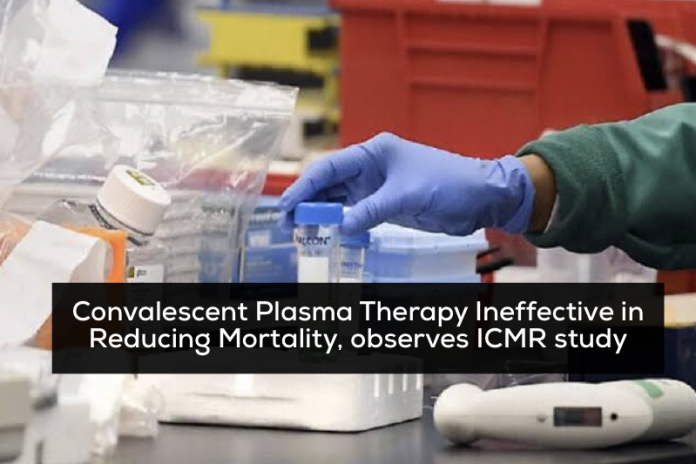In a recent study funded by Indian Council of Medical Research, it was found that the use of convalescent plasma therapy in Covid-infected patients does not help in reducing mortality or progression to severe Covid-19.
Although the study is yet to be peer reviewed, it got approval from the National Task Force, a committee formed by ICMR to respond to the pandemic.
It has appeared on medRxiv, a preprint server.
Objective
The study was carried out to determine the effectiveness of using CP in moderately-ill COVID-19 in limiting progression to severe disease and determine the associated short-term adverse effects.
Conducted across 39 hospitals
The ‘open-label parallel-arm phase II multicentre randomized controlled trial’ (PLACID Trial) was conducted across 39 public & private hospitals across India between April 22 and July 14.
The study involved 464 participants (moderately ill COVID-19 patients admitted to hospitals).
Convalescent plasma therapy
- It is a century-old therapeutic option used for the management of viral diseases.
- It involves taking antibodies from the blood of a COVID-19 recovered person & transfusing those into an active COVID patient to help kick-start the immune system to fight the infection.
- It got regulatory approval for use in patients in different countries & this has led to its widespread adoption in real-world clinical practice, where it is being used to treat COVID-19 patients with a wide spectrum of disease severity.
- The Indian government has allowed use of convalescent plasma for treating coronavirus-infected patients in moderate stage of the illness under investigational therapies.
Resource intensive
Although plasma therapy is a safe therapy, it is resource intensive and there are only a few institutes having the necessary infrastructure. There have been instances where there has been a call for donors via social media, black marketing, etc.
Process
- A total of 464 moderately-ill COVID infected hospitalised patients were involved in the study.
- 235 participants were given convalescent plasma along with best of standard care while the rest received only standard care.
- Those in the intervention arm were given 2 doses of 200 ml of CP, transfused 24 hours apart, in addition to the best standard of care.
- The two plasma units were collected preferably from different donors depending on the availability and ABO compatibility to increase chances of receiving CP with neutralizing antibody (NAb).
Two studies published
Two randomised controlled trials on CP use in COVID-19 have been published, one from China and the other from the Netherlands.
However, they were halted prematurely due to various reasons such low patient enrolment, etc.
No mortality benefit was noted in the studies.
The Dutch study raised uncertainties regarding pre-transfusion antibody-status of patients as a potential factor in identifying appropriate candidates for CP therapy.
This uncertainty is also reflected in a recent systematic review, which remained undecided on both the safety and effectiveness of CP as a therapeutic option in hospitalized patients of COVID-19.
Keeping in view these uncertainties, the study was carried out in India.
Major findings of the study
- The PLACID trial results indicate that there was no difference in 28-day mortality or progression to severe disease among moderately ill COVID-19 patients treated with CP along with BSC compared to BSC alone.
- The CP was not associated with reduction in mortality or progression to severe COVID-19.
- The trial has high generalisability and approximates real-life setting of CP therapy in settings with limited laboratory capacity.
- A prior measurement of neutralising antibody titres in donors and participants may further clarify the role of CP in management of COVID-19.
ICMR role
The ICMR’s central implementation team was responsible for study design, study coordination, data analysis, data interpretation and writing of the report.
Patient enrolment, data collection and actual conduct of the study was done at public and private hospitals independently and the investigators in the ICMR had no role in it.
Informed consent
All participants or their family members or legally authorised representatives were provided with all the information regarding the trial in language they understood.
Besides this, written informed consent was taken from the participants before recruiting them.
Source: The Tribune
Image Credits: Google Images





















